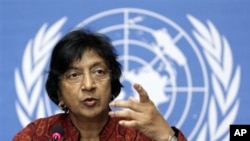U.N. High Commissioner for Human Rights, Navi Pillay, is calling for the release from prison of Chinese dissident and Nobel Peace Prize Winner, Liu Xiaobo. On the eve of Human Rights Day, Pillay says Liu Xiaobo illustrates the dangers and abuse to which human rights defenders around the world are subjected.
This year's human rights day, which falls on December 10, is dedicated to the hundreds of thousands of human rights defenders. U.N. Human Rights Chief, Navi Pillay, calls them unsung heroes.
She says they have changed history, tackling injustice and discrimination, often at great cost to themselves. Every year, she says, thousands of human rights defenders are harassed, abused, unjustly detained and even murdered.
She says Chinese Nobel Peace Laureate, Liu Xiaobo, is an example of a human rights defender who is paying a heavy price for his activism. She finds his 11-year prison sentence for trying to improve China's human rights extremely harsh.
Pillay says she also is dismayed at the recent restrictions China is placing on Liu's wife and on an every-widening circle of associates.
"In recent weeks, my office has received reports of at least 20 activists being arrested or detained and more than 120 other cases of house arrest, travel restrictions, forced relocations and other acts of intimidation," Pillay said. "These include Liu Xiaobo's wife, Liu Xia, who remains under house arrest-a house arrest, which in my view is in contravention of Chinese national law."
Pillay says she will continue to hold discussions with Chinese authorities on these cases.
Turning to another topical issue, the High Commissioner says the case of the whistle blowing internet-site, Wikileaks, raises complex human rights questions. She says these involve balancing freedom of information and the right of people to know against the need to protect national security and public order.
She says this is a very difficult balancing act, which ultimately will have to be decided in a court of law.
She says she is concerned by reports of pressure being exerted on private companies, including banks, credit card companies and Internet servers. She says this apparently is being done to close down credit lines for donations to Wikileaks, as well as to shut down the website.
"Taken as a whole, they could be interpreted as an attempt to censor the publication of information," Pillay said. "Thus, potentially violating Wikileak's right to freedom of expression. If Wikileaks has committed any recognizable illegal act, then this should be handled through the legal system and not through pressure and intimidation, including on third parties."
Pillay says she has read the files released by Wikileaks, which indicate the U.S. knew about the widespread use of torture and ill treatment of detainees by Iraqi forces.
She says she is dismayed that, despite knowing this, the U.S. proceeded with the transfer of thousands of people who had been detained by U.S. forces to Iraqi custody between 2009 and 2010. The High Commissioner says this could potentially constitute a serious breach of international human rights law.
UN Human Rights Chief Calls for Release of Liu Xiaobo
- By Diaa Bekheet














